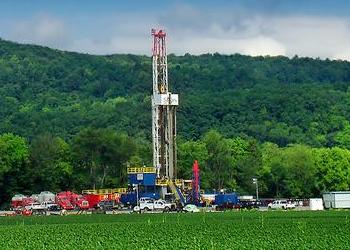
WASHINGTON, DC, September 29, 2012 (ENS) – Janet McIntyre suffers from the blood cancer leukemia, and she has experienced seizures and renal failure since gas wells were drilled near her home in Connoquenessing Township, western Pennsylvania.
McIntyre says she is exposed to noxious odors and her once clean water is now tainted. “Can I say it was because of them? I don’t know, but I do know a lot of people with the same illnesses,” she said.

Yet McIntyre has had a hard time getting answers from the Pennsylvania Department of Environmental Protection about whether the energy company doing the drilling is obeying the regulations meant to protect Pennsylvania residents.
“I find out more sitting at my computer than the DEP will tell me,” McIntyre told reporters on a teleconference Tuesday. When the emissions were particularly bad, she made inquiries of the energy company and state agency – both told her nothing had happened.
“But two or three months later I found out from the DEP website that something did happen,” said McIntyre. “I also found this incident also on the energy company’s website in a message to their shareholders.”
McIntyre is not alone. More and more people across the United States are experiencing similar problems, and new research points the finger of blame at state agencies that are failing to enforce their own oil and gas development regulations.
Earthworks, a nonprofit organization based in Washington, DC with field offices across the country, has released a year-long study of enforcement in six states – Colorado, New Mexico, New York, Ohio, Pennsylvania and Texas.
The study found more than half of all wells in these states go uninspected each year. Hundreds of thousands of active oil and gas wells across the country are not inspected at all.
The newly uncovered enforcement data shows that companies found to be in violation of state regulations are rarely penalized. Ambiguous policies and rules leave the consequences for violations unclear to the public, companies and even the inspectors themselves. Consequences vary from violation to violation, Earthworks investigators found.
Penalties are so weak that it is cheaper for violators to pay the penalty than comply with the law. “The total value of financial penalties in each state studied is less than or equivalent to the value of the gas contained in one single well,” Earthworks says in its report, “Breaking All the Rules: The Crisis in Oil & Gas Regulatory Enforcement.”

Researched and written by Earthworks’ Lisa Sumi, the report finds that, “Overall, and without exception, inspection capacity for each of the six states examined is egregiously lacking.”
While some states have increased their enforcement budgets in response to increased drilling, Sumi writes, “funding remains insufficient to provide for thorough and adequate inspections of oil and gas activities.”
“State enforcement of oil and gas rules is broken,” said Earthworks’ senior staff attorney Bruce Baizel. “Across the country, public health and safety are at risk because states are failing to uphold the rule of law. Until states can guarantee they are adequately enforcing their own rules on an ongoing basis, state agencies must not permit new drilling.”
Earthworks says failure to enforce oil and gas regulations means that states are not seeking, documenting, sanctioning, deterring, and cleaning up problems associated with irresponsible oil and gas operations such as chemical spills, equipment failure, accidents, and discharges into drinking water supplies
“I left my home in DISH because gas development threatened my family’s health,” said Calvin Tillman, former mayor of DISH, Texas. This community of roughly 200 people, established in 2000, was originally named Clark. In November 2005, the community accepted an offer to rename itself “DISH” [all capital letters] as part of a commercial agreement with a satellite television company
Tillman said that after drilling began near his home, his children developed nosebleeds when they were asleep. In their new home in another community, the nosebleeds stopped.
“Texas oil and gas regulators are ill-equipped and unmotivated to enforce their own rules,” said Tillman. “This report shows that rules and regs aren’t worth the paper they’re written on if they’re not enforced.”
The report recommends increasing inspection and enforcement resources until they meet a systematically and transparently developed minimum.
States need to clarify and update rules so inspectors, companies, and the public know when operators are in violation, and the consequences.
And the public’s role in enforcement should be formalized, the report recommends, including sharing information with the public and allowing citizen lawsuits.
Citizen empowerment would include learning how to document and complain without fear of reprisal.
Baizel said, “We see the first reports of issues from people who live near processing plants and wells, it becomes an early warning system. If there were a formalized way of channeling that, it would be a way to extend inspections.”
He pointed to an agreement signed between Gunnison County and the state of Colorado that allows the county to take on the inspection of wells within the county as another way of extending inspections.
“This report shows that the industry’s claim that ‘oil and gas development doesn’t threaten public health’ is a fraud,” said Earthworks Executive Director Jennifer Krill. “Until common sense changes are implemented, states must refuse to issue new drilling permits.”
Allan Septoff, Earthworks research and information systems director, told reporters, “Information is the best disinfectant. There’s a reason the oil and gas industry resists requirements to report and they are excluded from the national Toxics Release Inventory. They fight to preserve that. They are justly concerned that the more people know what they do, the harder it will be for them to do it.”
Copyright Environment News Service (ENS) 2012. All rights reserved.
